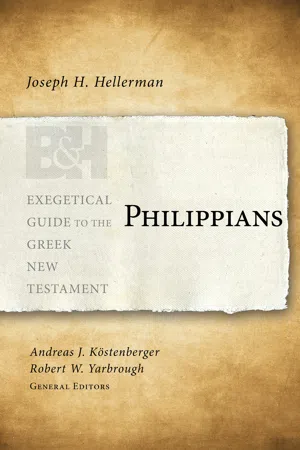Introduction (1:1–11)
A. GREETING (1:1–2)
| 1 Παῦλος καὶ Τιμόθεος |
| δοῦλοι Χριστοῦ Ἰησοῦ | πᾶσιν τοῖς ἁγίοις ἐν Χριστῷ Ἰησοῦ |
| τοῖς οὖσιν ἐν Φιλίπποις |
| σὺν ἐπισκόποις καὶ διακόνοις, |
| 2 χάρις ὑμῖν καὶ εἰρήνη |
| ἀπὸ θεοῦ πατρὸς ἡμῶν |
| καὶ κυρίου Ἰησοῦ Χριστοῦ. |
VERSE 1
Παῦλος καὶ Τιμόθεος δοῦλοι Χριστοῦ Ἰησοῦ
Παῦλος begins all Paul’s letters. Proper names are generally anar. in salutations (R 759). Σαῦλος is Paul’s “synagogue name” from birth, Παῦλος, his name in the Greco-Roman world. Jews in the Gk. world adopted names that sounded similar to their Heb. names (O’Brien 44; “Paul[l]us” was a common Lat. cognomen [BDAG 789b]; H. Balz, EDNT 3.59d).
Τιμόθεος (etym. “[one who] honors God”; common Gk. name) was a convert (μου τέκνον [1 Cor 4:17; cf. Acts 16:1–3]) who became Paul’s “co-worker” (ὁ συνεργός μου [Rom 16:21]) (BDAG 1006b; MM 635). Timothy is elsewhere included among the “apostles of Christ” (Χριστοῦ ἀπόστολοι [1 Thess 2:7]), a group of commissioned missionary-preachers who were not, however, apostles like Paul and the twelve (cf. Epaphroditus [2:26]). Timothy is neither (1) “co-writer” (pace BDAG 1006b; cf. εὐχαριστῶ [1:3]; 1 sg. “pervades Philippians” [H-M 4]), nor (2) Paul’s secretary or amanuensis (pace Fee 61; Hansen 38). Timothy is included, rather, as (3) a co-sender (Reumann 53), because of his key role as a coworker (cf. 2:19–24), and because he was among those who first brought the gospel to Philippi (not mentioned in Acts 16:11–40, but cf. 16:3 and 1 Thess 1:1; 2:2).
Δοῦλοι (nom. pl. masc.; appos. to Παῦλος καὶ Τιμόθεος [Porter 85 n. 1]) is intended
*1. negatively, of the servility and obedience associated with ancient slavery (“slaves” [NLT, HCSB] is better than “servants” [NRSV, NIV, NJB]) (H-M 6; O’Brien 45; Silva 40), rather than
2. positively, via the LXX, where it was an honor to be designated a “servant (δοῦλος) of the Lord” (Moses [LXX Neh 10:30]; Joshua [LXX Jos 23:30]; David [LXX Ps 88:21]; cf. also the Greco-Roman world, where a “slave of [a high-status person]” gains status by association) (BDAG 260c; A. Weiser, EDNT 1.352c; Reumann 82–83).
Reasons: (a) the exclusively negative connotation of δοῦλος in its only other occurrence in the letter (2:7); (b) the intent of the anomalous greeting (see below). It is not likely that Paul intended both meanings (pace Fee 63; Hansen 38–39).
Χριστός, from χρίω, “anoint” (BDAG 1091d), is used in LXX of anointed kings and high priests, occasionally prophets. Paul was certainly familiar with this OT background (cf. 2 Cor 1:21–22), but his Gentile audience would have needed instruction about the titular meaning of Χριστός as “Messiah.” Here Χριστός means not “Messiah” but functions, rather, as “the personal name ascribed to Jesus” (BDAG 1091b).
The etym. of Ἰησοῦς (“Yahweh saves” [cf. OT “Joshua”]), though familiar in Jewish-Christian circles (cf. Matt 1:21), would also have escaped Paul’s Gentile readers. Χριστός Ἰησοῦς became a two-part name, on the analogy of Caesar Augustus (Reumann 57). The gen. Χριστοῦ Ἰησοῦ can be taken as poss. or obj. (Reumann 54).
1:1 is unique among Paul’s salutations in two striking ways: (a) Elsewhere when Paul introduces himself as δοῦλος, he adds ἀπόστολος (Rom 1:1; Titus 1:1; often only ἀπόστολος [1–2 Cor; Gal; Eph; Col; 1–2 Tim]). (b) In no other greeting does Paul single out church leaders by the title (ἐπισκόποις καὶ διακόνοις). Commentators address the two anomalies separately. The absence of ἀπόστολος is explained by the “special bonds of affection” Paul shared with the Philippians (O’Brien 45; Silva 39; appropriate for the friendship genre [Fee 62]), or by a desire on Paul’s part not to draw any distinction between himself and Timothy in the greeting (K. Rengstorf, TDNT 2.277 n. 111).
The inclusion of ἐπισκόποις καὶ διακόνοις is interpreted as an attempt on Paul’s part
1. to buttress the leaders’ authority in the face of grumbling among the Philippians (2:14–15);
2. to show his regard for them while at the same time preparing to challenge them to tackle the difficult issues the letter raises (O’Brien 49–50; Silva 41); or
3. to single out the leaders because they oversaw Epaphroditus’s gift-bearing mission to Paul (Hansen 42; Chrysostom, Homily on Philippians, 2.1.1–2).
*4. But recent research points to another option. The two anomalies in the salutation should, instead, be taken together since they interpret one another when read against the social background of Roman Philippi. By (1) deemphasizing his own status (δοῦλος sans ἀπόστολος) and (2) honoring the congregation’s leaders with their titles (ἐπισκόποις καὶ διακόνοις), Paul intentionally subverts the honor culture of Philippi, where rank and titles were viewed as prizes to be competitively sought and publicly proclaimed, in order to enhance the holder’s social status. Paul thus begins, at the outset of the letter, to model a relational ethos he will later (1) commend to the Philippians (2:5) and (2) vividly portray in his remarkable narrative of the humiliation of Christ (2:6–8) (Hellerman 117–21).
πᾶσιν τοῖς ἁγίοις ἐν Χριστῷ Ἰησοῦ τοῖς οὖσιν ἐν Φιλίπποις
A verbless epistolary greeting with the recipients in the dat. (indir. obj. or dat. of “recipient” [Wallace 148]) is common (“not difficult to supply λέγει” [R 394]).
Though not a rarity in Paul’s greetings (cf. 1–2 Cor; Gal), the adj. πᾶς (here dat. pl. masc.) is employed of the Philippians eight times in t...




